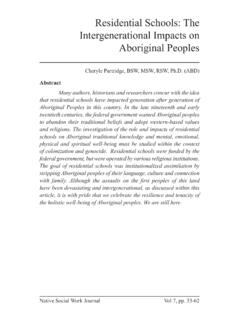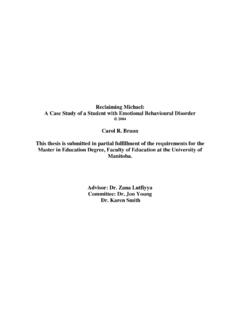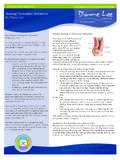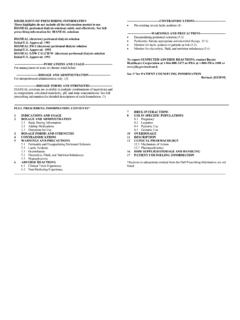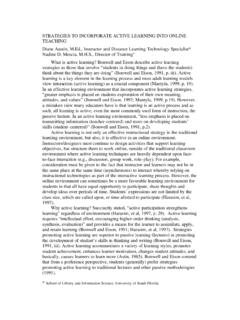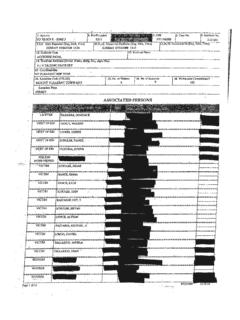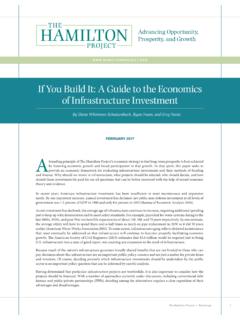Transcription of Diane of - Library and Archives Canada
1 Diane Collier, , An internship report submitted to the School of Graduate Studies in partial fulfilment of the requirements for the degree of Master of Education Facuity of Education Mernorial University of Newfoundland February 1998. St. John's Newfoundland National Libfary Biblioth que nationaie du Canada Acquisitions and Acquisitions et Bibliographie Sewices services bibliographiques 395 Weiimgton Street 395, rue Weiringtori OtEawaON K 1 A W OttawaON K 1 A W. Canada CanaQ. The author has granted a non- L'auteur a accord une licence non exclusive licence allowing the exclusive permettant a la National Libmy of Canada to Biblioth que nationale du Canada de reproduce, loan, distniiute or sell reproduire, pr ter, distribuer ou copies of this thesis in microform, vendre des copies de cette th se sous paper or electronic formats. la forme de microfichelhlm, de reproduction sur papier ou sur format lectronique. The author retains ownership of the L'auteur conserve la propri t du copyright in this thesis.
2 Neither the droit d'auteur qui prot ge cette th se. thesis nor substantiaf extracts from it Ni la th se ni des extraits substantiels may be printed or otherwise de celle-ci ne doivent tre imprim s reproduced without the author's ou autrement reproduits sans son permission. autorisation. ABSTRACT. This internship reports findings on the use of informa1 assessrnent in language arts, specificdly in a special education setting in the primary grades of one school. Assessrnent and interventions were carried out on an individual, small group and whole class level. Students' use of metacognitive strategies, especially self-tdk, in order to guide students' reading and writing were exarnined and encouraged. Students showed some improvement in this strategy use, displayed through anecdotal records of self-talk, over the 12 week period of the intemship. ACKNOWLEDGEMENTS. 1 gratefully acknowledge the support and patience of my f e l y and fiiends throughout my studies without whom this internship report could not have been completed.
3 1 thank Ms. Marg Ryall, my on-site supervisor, for her continuous encouragement, enthusiasm and sense of humour. 1 also thank the students and staff of Newtown EIementary who made me feel welcorne and allowed me to share in their classrooms. 1 am gratef l to Dr. Mark Glassman for his support throughout the project. TABLE OF CONTENTS. Page CHAPTER 1: I. The Internship Setting and 1. Goals for the -7. The Research 5. Limitations of the Research 5.. Orgamzahon of the 6. CtIAPTER II: REVIEW OF THE LITEMTLRE .. 7. 7. Early .. 8. bleaning-Centred L e h 9..4dministrative 10. Research Question: Metacognition in Reading and Wnting .. 11. CHAPTER III: RESEARCH COMPONENT: METACOGNITION IN READING. AND .. 31. Statement of 21. Data 21. Research 25. Student I .. 25. Student 3,.. 36. Student 3 .. 47. Student 60. CHAPTER IV: CONCLUSION AND RECOblMENDATIONS.~.. Discussion of Research 72. Discussion of Internship Goals and Objectives .. 72. Recornniendations .. 86. 87. ,.. ,.. 95.
4 CHAPTER CNE: rNTRODUCTION. The Intemshio Settinn and Experienceq The intemship site chosen by the intem was Newtown Elementary School, a school with the Avalon East School Board located in the city of Mount Pearl. Newtown Elementary is a three-strearn school which includes kindergarten to grade 6. There is a population of approximately 600 students and 30 teachen. The curent principal and vice-principal of Newtown Elementary have been working cooperatively to minimize reading and writing dificulties in the pnmary grades. Staff are actively involved in a process in kindergarten whereby snidents are identified for intensified instruction in reading and writing through a nurnber of informai assessmenrs and teacher observations. Students are identified for alternate instruction by the end of kindergarten and receive remedial or special education help in language arts in grade 1. In grades 1 and 3. they are either assigned to a special education teacher or kept in a remedial reading group.
5 The structure of services fluctuates ycarly depending on student need and teaching res urces. This site was chosen as the internship site because of the administrative leadership in early interve~tionin language arts and the close collaboration benveen trachers and administntors to achirve the goals of early intervention. In addition, the vice-principal worked as a special education offiring a dual perspective aion with supervision of the intern. During the 1996/1997 school year. grade 1 students rrceived remedial instruction -3. as a whole class. Eleven students were taught t~getherfor large blocks of tirne (1 1/2. ho rs/day), during which their ciassrnates also received languzge arts instruction fiom their classroom teacher. The special education teacher instmcted students at that t h e . The grade 2 students who received rernedial help came to the special education teacher for three half-hour periods every six-day cycle. The grade 2 and grade 3 studenrs who are classified as special education students received out-of-class instruction in language arts for I 112 hours each day.
6 The intem worked with dl of these groups of snidents. In addition to nnictured language arts instruction, the administrators at Newtown Elementary were attenipting to focus on imponant reading and writing skills such as phonernic awareness and a variety of readiiig and witing strategies, such as rereading and using contextual cues, which would enhance students' success and independence. Grade 1 teachers met weeldy to plan classroom activities anci tended to do the same curriculum topics and activitiss at the same times. During the school year, 1990- 1997, al1 prirnary teachers met to discuss strategies to deal ~6thconcems about reading and writing. The intem participated in these meerings as well. The intemship took place during a 12-week period fiom January to April, 1997. W s for the lnternship The intem idsntified three general goals to be met dunng the intemship. The intemship experiences werc categotized under one of cach of these goais. The intemship goals were defined as follows: (a) drveloping assessrnent and intervention strategies and 3.
7 Skills while working with students who were having difficulties in reading and writing;. (b) learning the types of administrative direction and intervention strategies which are successful in arriving at school-wide reading and writing success; and (c) using a metacognitive W e w o r k when working with four students in grades 1,2 and 3 in order to develop self-reliance, reflective skills, and independent reading and writing strategies. The third goal defined the research component of the internship. The development of assessrnent and intervention strategies and skills occurred through a number of activities. The intern leamed to assess individual students who were having difficulty in reading andor wriring and were recomrnended for remedial or special education instruction through the use of informai reading inventories md other informal mesures of language ability. Following the assessment process, the intern developed individual instructional activities based on the assessment results and carried out interventions with these students over the period of the intemship.
8 In addition, the intem canied out remedial instruction in cooperation with remedial and special education teachee in the regular classroom and with groups of two to four students who were receiving instruction outside of their regular classroom. Finally, the intem reviewed the literacy binder, Literacy dcvelopment in prirnary school: A support document for teachers and primary school administrators (1 996), prepared for primary teachers by the Avalon Consolidated School Board and reviewed current professional literature to detemine appropriate activities for this specialized instruction. h e second goal of the intemship was to learn about the types of administrative 4. direction and intervention strategies which are successful in arriving at school-wide reading and writing success, Le. How cm teachers help students with reading and writing difficulties? What makes teachea reflect on their instniction? The intem attempted to achieve these goals by attending and contributing to grade 1 teachers' weekly planning meetings and attending and contributing to primary teachers' long-term planning meetings for change in language arts instruction.
9 To get a full picrure of the school's approach, the intern also planned to interview the principal, the vice-principal and teachers about what they believe works best to bring about reflective practices for teachers and students. The intem kept anecdotal notes on teaching practices which appear to hinder or enhance teachers' reflective behaviour, as well as student progress. The third goal of the internship encornpassed the research component. The intem intended to use a metacognitive framework when working with four students in grades 1, 2 and 3 in order to develop self-reliance, reflective skills, and independent reading and writing strategies. In order to do this, she chose several foci for self-instruction training based on informal assessments. AAer these areas of emphasis were established, she showed students how to use general self-statements for problem-solving situations that they identify and encouraged them to use these staternents while they were working on a problem.
10 The intem also encouraged classroorn teachers to reinforce metacognitive strate ies within the classrooms of the children who were receiving the individualised instruction. This last activity \vas only carried out in an informa1 sense while talking with teachers about the students. The Research Cornnonent The research rnethodology for this intemship was qualitative. The intern wished to explore the possibiiities for self-ralk training with pNnary children and to record their progress and difficulties with the intention of refining such an approach for the classroom. Because of the idiosyncratic nature of the children's responses and progress, such findings would be dificult to The small sample size and the range of children in the study in terms of age, personality and Iearning needs precluded the usefulness of statistical analyses to compare the children. The intern cmied out individual informal assessrnents of four primary snidents as well as follow-up recommendations and interventions.



